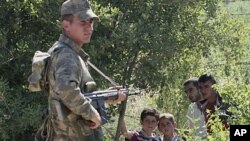Hundreds of Syrian refugees have crossed into Turkey to escape the latest upsurge of unrest in Syria. Turkey is bracing itself for a potential major exodus, as protests against Syrian President Bashar al-Assad escalate. There are growing concerns the destabilization in Syria could spill over into Turkey. Turkish Foreign Minister Ahmet Davutoglu said Thursday more than 2,500 civilians have entered his country since the unrest in neighboring Syria began in March. The influx prompted Turkish authorities to set up three camps to handle the crisis.
Hundreds of Syrians are continuing to cross into Turkey to escape President Bashar al-Assad's weeks-long crackdown against anti-government protesters. Some of the refugees are believed to be from the town of Jisr al-Shughour, where 120 security troops were reportedly killed Monday during the anti-government demonstrations.
The government has issued orders for security forces to hit back, accusing the protesters of being armed bandits.
With the escalating violence, political scientist Soli Ozel says a major crisis could be looming; 250 refugees fled the conflict last month.
"You are liable to get massive influx of people trying to escape the war zones," Ozel said.
The Iraq crisis saw tens of thousands of people seeking refuge in Turkey, and according to Turkish media reports, facilities for 10,000 refugees are now being prepared.
There is visa-free travel between Turkey and Syria, and Turkish Prime Minister Recep Tayyip Erdogan said Wednesday the border would remain open.
Mr. Erdogan said at this point, closing the border is out of question. He said his government is following the developments in Syria with concern, and urged Damascus to show more tolerance toward its citizens and take concrete steps toward reform as soon as possible.
The Turkish prime minister has pressed President Assad to introduce reforms, but has resisted domestic and international pressure to take a tougher line, saying Damascus should be given time.
But the escalating crisis has seen Ankara toughening its language towards Damascus. Diplomatic correspondent for the Turkish daily Milliyet, Semih Idiz, says the government is taking an increasingly more nuanced stance.
"We understand there is still a dialogue between Bashar al-Assad and the prime minister, Tayyip Erdogan. On the other hand, the Syrian opposition met in Turkey and that could not have gone down very well in Damascus," Idiz said.
One reason behind Ankara reaching out to Syria is that it has a restive Kurdish population, which political scientist Nuray Mert of Istanbul University says has close ties with the Kurdish rebel group, the PKK, which is fighting the Turkish state.
"We know that there are very close links between PKK and Syrian Kurds, and this [is] another threat of destabilization in Turkey because anyway we have huge problems concerning the Kurdish problem," Mert said.
One of the main factors behind the rapprochement between the two countries was President Assad's crackdown against Syrian Kurdish nationalists. Now, according to diplomatic correspondent Idiz, Ankara fears Mr. Assad may be reaching out to his restive Kurdish population.
"We understand Bashar al-Assad is now trying to co-opt the Kurds. What happens to them politically and how they interact with northern Iraq and the Kurds in Turkey is of relevance [to] Ankara," Idiz said.
With the Syrian president increasingly isolated and desperate, concerns in Turkey that instability could spread to its territory are growing.
"Many people in the bordering areas in Syria and Turkey have relations, and there is the Alevi and Sunni situation also, [which] plays out in Turkey. Do not forget Turkey has Alevi population that numbers anything up to 12 million," Idiz said.
Ankara will be hoping the Syrian crisis can be defused by government reforms and negotiations with the Syrian opposition, but as violence increases, observers say that is looking unlikely.
Increasing Number of Syrians Flee to Turkey















